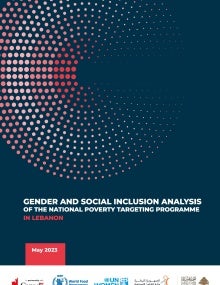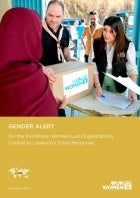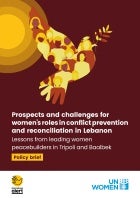1 - 10 of 10 Results
Date:
This paper was commissioned by UN Women Lebanon and developed by Kafa as part of the “Implementing the Women, Peace, and Security Agenda in Lebanon through building pathways for dialogue and inclusive governance” project, funded by Norway.
Date:
A research analysis on how Lebanese history textbooks portray women and gender issues, including the participation of women in writing these narratives. This paper was commissioned by UN Women Lebanon and developed by Kafa and the Lebanese Association for History as part of the “Implementing the Women, Peace, and Security Agenda in Lebanon through building pathways for dialogue and inclusive governance” project.
Date:
Following the ceasefire reached on 27 November 2024, around 80 per cent of internally displaced persons are estimated to have returned to their places of origin. However, many others are unable to return to their communities due to damage and destruction, as well as restrictions imposed by the Israeli Army. Of the 20 percent that remain internally displaced, 52 per cent are women and girls.
Date:
Driven by the intensifying conflict, the recent escalating humanitarian crisis in Lebanon, has taken a profound toll on people’s lives. On the frontlines of the crisis response, women-led organizations (WLOs) are delivering critical, life-saving humanitarian assistance to affected populations, including women and girls in need.
Date:
As conflict in Lebanon intensifies and humanitarian response continues, this Gender Alert draws attention to the disproportionate impact women and girls in Lebanon, including women-headed households and women with disabilities in areas such as food security, shelter, WASH, Mental Health and Protection including Gender Based Violence and Violence against Women.
Date:
The Rapid Gender Analysis assesses the impact of the escalating conflict at Lebanon's southern border on men and women in all their diversity and vulnerable groups. It identifies increased barriers to access resources and opportunities for women, exacerbating existing inequalities. Challenges include infrastructure damage, supply chain disruptions, and displacement, particularly in disadvantaged areas. Access to shelter, health services, and livelihoods is further compromised. While coping mechanisms and solidarity networks offer support, ongoing insecurity and cultural barriers hinder effective safety nets and resilience-building efforts.
Date:
Since 8 October 2023, the spillover effects of the exchange of fire at the Lebanese southern border has led to killing and injuring of civilians in the south of Lebanon and the internal displacement of 58,835 residents from South Lebanon (as of 9 December 2023). To shed light on how women have been affected by the conflict, and their ability to assist in local crisis response, UN Women Lebanon and its partners have worked together to provide this Gender Alert amid the ongoing security and humanitarian crisis in south Lebanon. The findings provide observations on relevant gender equality issues to help UN Women and the humanitarian community pinpoint crucial areas of humanitarian response to incorporate into emergency preparedness and response planning.
Date:
This newsletter captures the latest updates on the implementation of the Women’s Peace and Humanitarian Fund (WPHF) in Lebanon. The newsletter includes the key highlights and achievements of the WPHF programme partners' towards enhancing women’s participation in the Beirut Port Explosion’s response and recovery process.
Date:
In 2021, Alert, with the support of UN Women, conducted a gender-sensitive conflict analysis, zooming in on Tripoli and Bekaa, with generous funding from the Government of UK. This analysis has demonstrated how unresolved issues from the past, and particularly the civil war, are compromising peace and reconciliation processes and limiting women’s central role in these processes. It also found that women, young women, and young men coming from lower socioeconomic classes and peripheral areas are distinctly disenfranchised from meaningful participation in peace and security. Furthermore, gender, class, age, and nationality continue to be points of division & tension among communities in Lebanon that are often triggered by memories from the civil war. Thus, hindering cross-community and intergenerational dialogue exchanges and the capacities of women to lead community groups to build bridges across divides and work towards a collective peace memory.
Date:
This report is part of the “Dealing with the Past – DWP” project, funded by UN Women and implemented by Legal Action Worldwide. It focuses on female survivors and victims of gendered based violence from the Lebanese Civil Wars until the present.










